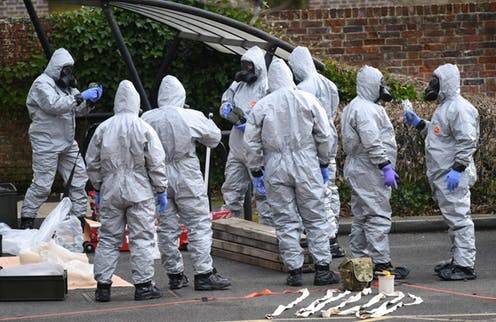State sponsored poisoning in the UK: Why it affects us all
Four weeks ago, on a quiet Sunday in one of Britain’s most beautiful cathedral cities, home to people of many different nationalities, including Nigerians, a father and daughter were struck down by the first offensive use of a nerve agent in Europe since the Second World War. Sergei and Yulia Skripal are still lying stricken […]


Four weeks ago, on a quiet Sunday in one of Britain’s most beautiful cathedral cities, home to people of many different nationalities, including Nigerians, a father and daughter were struck down by the first offensive use of a nerve agent in Europe since the Second World War.
Sergei and Yulia Skripal are still lying stricken in hospital. A police officer who went to their aid was also critically injured. Over 100 citizens were forced to seek medical treatment simply because they were nearby when the nerve agent was released.
What happened in Salisbury on March 4 was a brazen attempt to murder civilians on British soil, endangering anyone – of any nationality – who chanced to be in the vicinity. If this could happen in Salisbury, the blunt truth is that an incident of this kind could happen anywhere.
British scientists have identified the substance used against the Skripals as a Russian military-grade nerve agent known as “Novichok”. Today, only Russia combines a record of state-sponsored assassinations with an avowed motive for targeting Sergei Skripal – and stockpiles of “Novichok” agents.
After the attack, the British Government gave the Kremlin an opportunity to explain if any of this substance had gone missing. But this request was contemptuously ignored, leaving the Government with no choice except to conclude that the Russian state was guilty of attempted murder in a British city, using a lethal nerve agent banned by the Chemical Weapons Convention.
The incident in Salisbury falls into a pattern of the Kremlin’s lawless and reckless behaviour. Since 2014, Russia has annexed Crimea, ignited the flames of conflict in eastern Ukraine, hacked the German Bundestag and the Danish government and interfered in European elections.
Now they have gone so far as to use a banned nerve agent on European soil. The fact that more people are not in hospital in Salisbury is only down to luck; the perpetrators obviously did not care how many innocents they endangered.
Britain has responded by expelling 23 undeclared intelligence officers from the Russian Embassy in London. And, in an unprecedented display of international unity and condemnation, twenty seven other countries around the world, including the United States, Australia, Canada, France and Germany, have expelled or announced plans to expel Russian diplomats. This sends a clear message that there are costs and consequences for the Kremlin’s lawless behaviour. This is a time for allies and friends to stand together to uphold the rules on which the safety of every nation depends.
No country should see what happened in Salisbury as something far away from its shores. If we do not call out against such deplorable conduct, then the Russian state will continue its pattern of dangerous and destructive behaviour.
Our quarrel is not with the Russian people, whose cultural and literary achievements shine down the centuries. We will never forget the fortitude shown by the Russian nation during the Second World War, nor our common alliance against Nazism. But we all share an obligation to oppose the Kremlin’s ambition to divide and weaken the international community. This outrage took place in a peaceful provincial city in Britain; next time it could be anywhere. All the more reason for peace-loving democracies everywhere to stand united in voice and action, condemning this deplorable incident.
Paul Arkwright is the British High Commissioner to Nigeria
